
As well as being a Time Extension contributor, Mikolai Napieralski runs Forgotten Worlds, a website about video game magazines. It's a magazine about video game magazines, and he's here to tell you about it, and several other examples...
My COVID fever dream has a tangible form. Forgotten Worlds is ‘a magazine about old video game magazines’. It’s available to purchase now. 64 pages, perfect bound, full-colour, yada-yada...
The idea first came to mind back in 2021 when the whole world was in lockdown and everyone was looking for a way to keep the space madness at bay. I opted to channel my energy into a printed magazine on the most niche topic I could think of.
In the two years it’s taken to align everything and bring it to market, I’ve learned I’m not the only one. Turns out there are a bunch of folks out there doing similarly weird, niche, and obscure publishing ventures.
So I reached out to talk shop, learn about their projects, and ask why anyone would publish a limited run magazine in 2023.
#1. The Photographer
The Devils Blush Twitter account is run by Will Stevenson and specialises in video game screenshots filtered through heavy scanlines to evoke CRT nostalgia.
As Wil explains, “I started out photographing PC Engine games in 2018. They had a particular look and mood to them that caught my interest. I’ve always hated the feeling of seeing something cool in a game and then just letting it go, so the photos were an attempt to capture that.”

His images quickly found an audience, driven by Will’s ability to recontextualise old games through a photographer's lens. “I like dense pixel art title screens, chunky 3D character models, regular urban environments and catching enemies in nice-looking formations. I feel like there’s something cool to look at in the majority of games, it’s just a matter of whether I can find a way to frame the scene nicely.”
The Devils Blush magazine gives these fleeting, ephemeral moments a physical, printed form. A way to live on beyond the confines of a TV screen or website.
#2. The Collector
It’s no secret that the Western appetite for magazines isn’t what it used to be. Websites have mostly replaced the local newsagent, and magazine distribution numbers fell off a cliff back in the mid-2000s.
Japan is a little different. The continued popularity of Manga has helped sustain a cottage industry of privately printed magazines known as doujinshi. These are defined as, “Independently produced and distributed magazines, generally made in small print runs and often written by fans of manga and/or anime.”
Esudabu has used that infrastructure to publish something a little different. A magazine about the PC Genjin franchise. AKA, Bonk, AKA PC Kid.

A fan of the original PC Engine trilogy by Hudson Soft, he rediscovered his love of the series and its broader international audience in 2018. “I learned that the Bonk / PC Kid series was being sold all over the world. It brought back nostalgic memories, so I decided to collect all the games [and their international variations].”
What was originally just a web resource showcasing his collection became a more ambitious project when he came across the PC Engine Complete Guide and realised there was a market for printed publications covering retro consoles and games.
#3. The Completionist
Mathew Kumar has been producing limited-run zines about the games he’s completed since 2009. Focusing predominantly on older arcade titles, he’s lost track of the end credits he’s seen. But as he explains, “It's actually been an incredibly valuable way to really understand a video game in full. I've become a huge proponent of games being shorter as you become aware of just how much filler developers put into games, especially these days.”

His writing, and the magazine it’s attached to, taps into the underground, anti-establishment origin of zines. As Mathew explains, “There's something more counter-culture about them than ever. If I wanted to reach a large audience, I could do TikToks, but what value am I actually creating? Zines are always going to be disposable, but they're something disposable that the right person is going to value, and that's magical to me.”
An Escape From A Social Hellscape
What broadly links all these publications is the view that social media ain’t what it used to be, and finding an audience of like-minded fans has gotten progressively harder as social media has become bloated with spam, bots, and ads.
“Social media has become absolutely useless for sharing anything meaningful,” says Mathew. “Good, detailed video game writing is simply lost in the endless churn. I wanted to put my writing out in a way that people who *want* to genuinely engage with writing and video games could get a pleasant little object to own [and] give their full attention to.”
He’s not alone. Wired magazine published a piece about the increasingly hostile attitude of social media companies towards their end users earlier this year. The feature coined the term ‘Enshittification’ and argued that all social media companies go through three phases.

“Surpluses are first directed to users; then, once they're locked in, surpluses go to suppliers; then once they're locked in, the surplus is handed to shareholders and the platform becomes a useless pile of shit,” explained writer Cory Doctorow. “From mobile app stores to Steam, from Facebook to Twitter, this is the enshittification life cycle.”
If you’ve spent any time online, that scenario probably sounds familiar. Social media is no longer designed for the end user, and it’s becoming increasingly difficult to reach an audience of like-minded people. Our digital Tower of Babylon is crumbling around us.
So, how do you get off the hamster wheel and regain control? For an increasing number of people, limited-run publications are a way to give their digital projects a real-world presence. A way to curate content on their own terms.
While these publications are never going to match the broad reach and convenience of the online world, they do provide some insurance against a mercurial billionaire blowing up his new toy.
